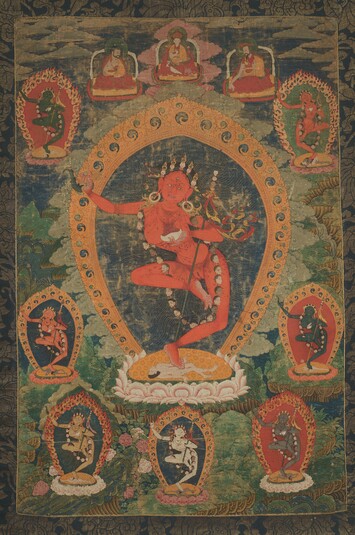
Item: Vajrayogini (Buddhist Deity) - Vajravarahi, Red
| Origin Location | Bhutan |
|---|---|
| Date Range | 1800 - 1899 |
| Lineages | Drukpa (Kagyu, Bhutan) and Buddhist |
| Material | Ground Mineral Pigment on Cotton |
| Collection | Rubin Museum of Art |
Classification: Deity
Appearance: Semi-Peaceful
Gender: Female
Vajravarahi (Tibetan: dor je pag mo): Vajravarahi is one of the most popular and commonly depicted meditational deities of Tantric Buddhism. She is also found in the same Sanskrit literature (Abhidhana Uttaratantra) that describes the deity Chakrasamvara. Vajravarahi is a form of the deity Vajrayogini. The only difference in appearance is that Vajravarahi has a boar's head attached to her own, either placed on the top of the head or on the right side of the head. (See a comparison of body proportions between this image of Vajravarahi and two other paintings and also a comparison with a sculpture HAR #19668).
Video: Masterwork: HAR 65858
Vajravarahi is red in colour with one face and two hands. The right hand holds aloft a curved knife and the left a skullcup to the heart. In the bend of the left elbow a katvanga staff is held against the left shoulder. Adorned with bone ornaments and a necklace of heads she stands in a dancing posture on a corpse seat. She is surrounded by seven retinue figures all in the same posture but appearing in various colours. Directly above the central figure are three seated Bhutanese religious teachers. On the left, the the Bhutanese teacher wears a blue cap with a gold finial characteristic of the Gyalwang Drugchen Rinpoche of Tibet and also worn by the Je Khenpos of Bhutans. The blue cap has a long history in the Drugpa Kagyu tradition going back to the time Tsangpa Gyare. (See another painting that depicts five secondary figures in the composition wearing the blue cap).
Sanskrit: Vajravarahi Tibetan: Dor je pag mo
Tibetan: Dor je pag mo
This form of Vajravarahi is considered one of the special practices of the Drugpa Kagyu Tradition and arises from the Chakrasamvara cycle of tantras belonging to the wisdom class of Anuttarayoga Tantra.
Lineage: Vajradhara, Tilopa, Naropa, Marpa (1012-1097), Milarepa (1040-1123), Dwagpo Sonam Rinchen, Pagmodrupa, etc.
Jeff Watt 11-2009
Publication: Selection of Works - Painting (RMA)
Subject: Masterworks Main Page (大师之作主页, ཕུལ་བྱུང་གི་སྒྱུ་རྩལ་ཁག།)
Thematic Sets
Collection of Rubin Museum of Art: Painting Gallery 4
Collection of Rubin Museum of Art: Bhutan
Buddhist Deity: Vajrayogini Art History
Buddhist Deity: Vajrayogini, Vajravarahi Main Page
Region: Bhutan: Painting & Textile Masterworks
Buddhist Deity: Vajravarahi (Best Examples, Painting)
Buddhist Deity: Vajrayogini, Vajravarahi Study Guide (Brief)
Buddhist Deity: Vajrayogini (Miscellaneous Masterworks)
Buddhist Deity: Vajrayogini, Varahi (Painting Masterworks)
Buddhist Deity: Vajrayogini, Varahi (Sow Head on the Right Side of the Face)
Glossary: Vajrayogini/Varahi
Buddhist Deity: Vajrayogini, Varahi (Comparison)
Collection of RMA: Painting Masterworks Page
Collection of RMA: Bhutan Masterworks
Buddhist Deity: Vajrayogini (Masterworks)







